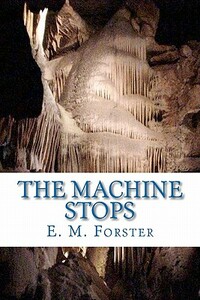Take a photo of a barcode or cover
It's so mind-blowing to me that this story was written more than a hundred years ago and it's extremely relevant right now. The Internet wasn't even a thought at that point and even though phones existed they were still not common. So the fact that Forster basically foretold modern communication is fascinating (and also alarming).
The story focused on the necessity and importance of face to face human interaction in a world where touching each other is obsolete and humans solely communicate through technology. Everyone is completely isolated, both from other humans and nature.
The Machine replaced every need; physical needs, communication, intellectual needs and spiritual needs. Everyone lives in total comfort and everything is the same. Yet something is missing.
This story serves as a cautionary tale for what happens when we collectively stop asking questions or take "just because" as an answer.
The story focused on the necessity and importance of face to face human interaction in a world where touching each other is obsolete and humans solely communicate through technology. Everyone is completely isolated, both from other humans and nature.
The Machine replaced every need; physical needs, communication, intellectual needs and spiritual needs. Everyone lives in total comfort and everything is the same. Yet something is missing.
This story serves as a cautionary tale for what happens when we collectively stop asking questions or take "just because" as an answer.
Ok this was super short and really good! The fact that it was written in 1909 is just so wild! The technology talked about is just so similar to today’s that it’s creepy! The whole concept was interesting and really left a strong message about the dangers of relying too heavily on technology. Would highly recommend!
Scarily accurate dystopian tale
A world in which people have every need catered for without leaving their room. Where they have thousands of friends, but live in isolation, and communicate only via technology. incredibly, it was written in 1909
A world in which people have every need catered for without leaving their room. Where they have thousands of friends, but live in isolation, and communicate only via technology. incredibly, it was written in 1909
dark
reflective
medium-paced
Plot or Character Driven:
A mix
Strong character development:
Yes
Loveable characters:
Complicated
Diverse cast of characters:
No
Flaws of characters a main focus:
Yes
Very interesting read. Holds up to this day and shines a light on the fact that we have been battling with the problems this books presents for longer than some people might think.
dark
mysterious
reflective
tense
slow-paced
Plot or Character Driven:
Plot
Strong character development:
No
Loveable characters:
No
Diverse cast of characters:
No
Flaws of characters a main focus:
Complicated
Wow...not sure what to say. Astonishing how well he predicted some of our current trends in social (non) interaction.
If WALL-E was written in 1909 without the adorable robot and people who lived isolated lives underground instead of in a space ship.
E.M. Forster's technological predictions are shockingly accurate.
E.M. Forster's technological predictions are shockingly accurate.
reflective
sad
slow-paced
Für einen kurzen Moment erblickten V und K ein Meer aus Toten und, bevor sie sich mit ihm vereinten, einen Streifen makellosen Himmels.
Yikes! Written in 1909, this story reads as a parody of modern life. Alternately, one wonders if somehow people reading this story were inspired by its ideas and mistook it for a guide, reading it literally, ignoring the ironic tone, instead of as dystopia and cautionary tale. A disturbing sensation.
"Vashti was seized with the terrors of direct experience."
"'Beware of first-hand ideas!...First-hand ideas do not really exist.'...Let your ideas be second-hand, and if possible tenth-hand, for then they will be far removed from that disturbing element - direct observation."
The story serves as a reminder to use the body and to appreciate our corporeality. It invites us to open our windows, go outside, let the sun and the rain fall on us, and explore the world. Let us move freely, be present with and touch each other. Let us enjoy a sense of openness and space. Go forth!
It emphasizes the value of direct experience and observation.
After writing this Goodreads review, it's tempting to post to Facebook and share the ideas within! Oh, dear. Go to yoga and walk the dogs instead?
Quotable:
"She knew several thousand people, in certain directions human intercourse has advanced enormously."
"The room, although it contained nothing, was in touch with all that she cared for in the world."
"It was naked, humanity seemed naked, and all these tubes and buttons and machineries neither came into the world with us, nor will they follow us out, nor do they matter supremely while we are here."
"But Humanity, in its desire for comfort, had over-reached itself. It had exploited the riches of nature too far. Quietly and complacently, it was sinking into decadence, and progress had come to mean the progress of the Machine."
Pairs well with: To wallow in the dystopic impulses, GeorgeOrwell's 1984 and the short story "Division of Labor," by Benjamin Roy Lambert in Lightspeed Magazine.
To break free and venture out, "Wanderlust: A History of Walking," by Rebecca Solnit.
"Vashti was seized with the terrors of direct experience."
"'Beware of first-hand ideas!...First-hand ideas do not really exist.'...Let your ideas be second-hand, and if possible tenth-hand, for then they will be far removed from that disturbing element - direct observation."
The story serves as a reminder to use the body and to appreciate our corporeality. It invites us to open our windows, go outside, let the sun and the rain fall on us, and explore the world. Let us move freely, be present with and touch each other. Let us enjoy a sense of openness and space. Go forth!
It emphasizes the value of direct experience and observation.
After writing this Goodreads review, it's tempting to post to Facebook and share the ideas within! Oh, dear. Go to yoga and walk the dogs instead?
Quotable:
"She knew several thousand people, in certain directions human intercourse has advanced enormously."
"The room, although it contained nothing, was in touch with all that she cared for in the world."
"It was naked, humanity seemed naked, and all these tubes and buttons and machineries neither came into the world with us, nor will they follow us out, nor do they matter supremely while we are here."
"But Humanity, in its desire for comfort, had over-reached itself. It had exploited the riches of nature too far. Quietly and complacently, it was sinking into decadence, and progress had come to mean the progress of the Machine."
Pairs well with: To wallow in the dystopic impulses, GeorgeOrwell's 1984 and the short story "Division of Labor," by Benjamin Roy Lambert in Lightspeed Magazine.
To break free and venture out, "Wanderlust: A History of Walking," by Rebecca Solnit.


